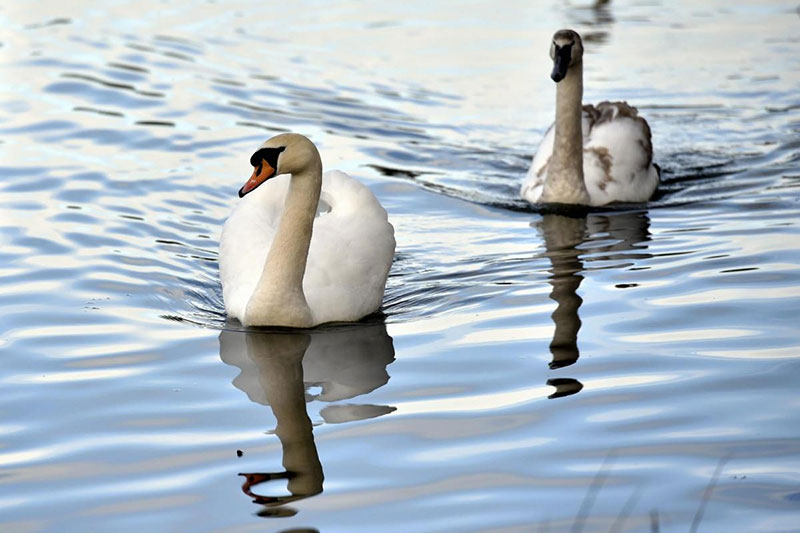Should we feed bread to Ducks and Swans?
There has always been discussion over whether feeding bread to ducks and swans is in their best interest. Unfortunately there is a lot of conflicting advice to be found on what is right for these birds.
A rescue charity created a ‘Bin the Bread’ campaign, in contrast to this mysterious signs encouraging bread feeding due to starvation in ducks have appeared near ponds and lakes. Certain experts have publicly stated there is “no good reason” not to feed swans bread however the RSPB are adamant that “swans are perfectly capable of feeding themselves”.
All these voices and all this conflicting advice, results in confusion over what people should and shouldn’t feed pond birds.

Feeding Bread to Ducks
Now, like many birders, I was first introduced to the joys of wildlife by feeding ducks bread at a local park. I truly believe that the experience of feeding wild animals or birds is a great way for people to become connected to nature. However I am not a fan of feeding bread to ducks – as there are simpler, better, and equally easy, options available.
At some level, I do understand the argument for bread. We’ve fed ducks bread for hundreds of years, and a small amount (every now and again) wouldn’t do ducks too much harm. The crucial point is; too much bread could do much more harm than good, and moderation is hard to both judge and maintain.
All wild animals are “convenience” feeders, to a degree. So to conserve energy for the winter, will often eat the closest food at hand, rather than go searching. However, to survive, wild animals need to eat things that offer the best nutritional value, even if that requires a little more energy to find.
Ultimately, this means that filling up on nutritionally poorer foods could be detrimental. An easy way to look at it is ‘bread for ducks is like bread for humans’. It’s not nutritionally dense, but it fills you up, so you don’t fancy anything healthy!
Bread can be a source of carbohydrates for ducks, but it offers little else of nutritional value. Ducklings require a varied diet and plenty of natural plants and insect proteins to mature properly. If ducks are regularly fed bread, their ducklings will not receive adequate nutrition for proper growth and development.
When too much bread is offered to ducks, not all of it will be eaten. Soggy, uneaten bread can lead to greater algae growth, which often clogs waterways and crowds out more desirable plants. This pollution can eventually eradicate fish, amphibians, crustaceans, and other life in the vicinity, making good food sources even scarcer.
Feeding Bread to Swans
So does the same apply to swans? The truth is that these birds have a very different digestive system, which allows them to consume and digest high-fibre food.
Swans are able to digest wheat primarily due to two specialised adaptations. The first adaptation is the physical structure of the digestive system.
They have large and muscular proventriculus and an extremely well-muscled gizzard that can develop pressures, in the case of Swans, up to 275 mm Hg. The action of these organs results in both the release of cell sap and cell crushing. This allows the food source to be further digested. In the case of bread, this is essential to strip out the nutritional content.
The second adaptation is the microbial breakdown of fibre in the extremely well-developed caeca and large intestine. This efficiency in fibre utilisation is crucial and exists despite the fact that food passes through the digestive tract of these animals relatively rapidly.
In short, swans are not only able to feed on items like wheat but actually get reasonable nutrition out of it.
Should I feed bread to pond birds?
If you do want to feed bread to birds, only a very little, very rarely can be justified. Remember it can pollute waterways and have a negative effect on other wildlife.
So, I should still feed birds?
Yes! All wildlife can do with a helping hand. Our advice would be; by all means feed your local swans and ducks but feed them a better food. If you are after the perfect food for garden birds, look no further than Peter & Paul.
What Should I Feed Ducks & Swans?
Feeding ducks and swans at your local pond or lake is much the same as feeding the birds in your garden. Ask yourself: What do these birds eat in the wild? What is their natural food?
Insects, worms, caterpillars, seeds, berries, aquatic plants are natural sources of nutrition. If they can’t find enough, then we can help enormously by providing equivalents. As an alternative we encourage people to use sweetcorn, porridge oats and defrosted frozen peas. Alongside these use bird seed and specialist food like Wild Things Swan & Duck Food.
It only takes a few simple changes, such as avoiding going to the same duck-feeding hotspots, exercising portion control or swapping bread for food closer to their natural diet to make a MASSIVE difference.


